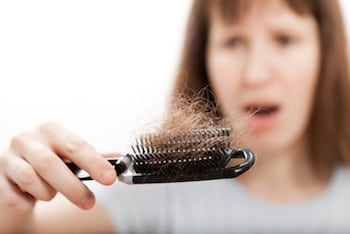My arms were tingly, my hair was falling out and I felt tired ALL of the time. This may sound like a typical day in the life of a mommy but when I was experiencing these symptoms I didn’t have a screaming baby or energetic toddler to deal with. I wasn’t even pregnant. It was my thyroid. My under active thyroid (hypothyroid) to be exact.
Located at the base of your neck, just below the Adam’s apple, the thyroid is an endocrine gland that controls how quickly the body uses energy, makes proteins and produces hormones that regulate the rate of metabolism and affect the growth rate of function in many other systems in your body. Having a hypo (indicates a deficiency) thyroid means your thyroid isn’t producing enough thyroid hormones, which can result in that sluggish feeling I had as well as dry skin and brittle nails, sensitivity to cold, constipation, memory problems, heart palpitations and heavy or irregular periods.
 Hypothyroidism is one of the most under diagnosed conditions in the United States but is also one of the easiest to treat. It’s symptoms of lethargy, depression and weight gain can easily be attributed to other factors, making it difficult to diagnose and difficult to even recognize. My symptoms didn’t happen all at once and individually they didn’t point to a dysfunctional thyroid.
Hypothyroidism is one of the most under diagnosed conditions in the United States but is also one of the easiest to treat. It’s symptoms of lethargy, depression and weight gain can easily be attributed to other factors, making it difficult to diagnose and difficult to even recognize. My symptoms didn’t happen all at once and individually they didn’t point to a dysfunctional thyroid.
It started with an unfortunate flat iron hair debacle (a story for a different time) that left me with very short bangs. At the time I thought I just left the iron on my hair too long (which is still a possibility) but as I looked back I realized there had been more hair than usual in my shower drain and on the floor of my bathroom. Straightening my hair only made it more brittle and more prone to falling out. My symptoms then escalated to sluggishness and muddled thinking and capped with constant tingling in my forearms. The tingling was by far the most concerning symptom to me, even though I had weird hair for a good year!
While my symptoms may sound dramatic, it wasn’t dramatic enough to really make me worry. I was more curious than concerned. The curiosity eventually led me to a doctor for a physical exam where I made sure to bring up my unusual symptoms. After several questions and a blood test it was revealed that my Thyroid-stimulating hormone (TSH) and Thyroxine measurement (T4) levels were lower than average. My doctor prescribed Synthroid to help regulate my thyroid hormones. Synthroid is a small pill that I have to take every morning one-hour before I can eat anything. At first taking the pill was a little unusual but now it’s second nature. Other than taking Synthroid daily I currently visit an endocrinologist twice a year to make sure the amount of Synthroid I take is still effective. It requires more blood work and a simple visit to my doctor at Northeast Florida Endocrine.
 If not treated, a hypothyroid can raise your cholesterol levels and make you more likely to have a heart attack or stroke. Pregnant mothers should especially check their levels, as an untreated hypothyroid can harm the baby. A warning to pregnant mothers who do have hypothyrodism – if you’re taking prenatal vitamins make sure you do not take them at the same time as your thyroid medication. The prenatals can interfere with Synthroid’s function. I would take mine about three hours after my Synthroid.
If not treated, a hypothyroid can raise your cholesterol levels and make you more likely to have a heart attack or stroke. Pregnant mothers should especially check their levels, as an untreated hypothyroid can harm the baby. A warning to pregnant mothers who do have hypothyrodism – if you’re taking prenatal vitamins make sure you do not take them at the same time as your thyroid medication. The prenatals can interfere with Synthroid’s function. I would take mine about three hours after my Synthroid.
And while I want to tell you that my 100 micrograms of Synthroid has 100% cured me of my symptoms I have to admit that on occasion I still feel mental fog and tingly arms. After doing a little research upon my initial diagnosis and later paying attention to when I felt more tired and tingly I realized that certain foods had a lot more to do with my symptoms than I realized.
If you google “hypothyroid foods” you’ll come across a slew of different articles about which foods are the best and worst to eat for the condition. And they all pretty much say the same thing – avoid goitergenic foods. Goitergenic foods suppress the function of the thyroid gland by inflaming the tissues and blocking iodine uptake. Goitergenic foods are generally beneficial in fighting off other diseases in healthy people but can cause an enlargement of the thyroid, aka goiter.
Here are some of the goitergenic foods on the “do not eat” list: cruciferous vegetables such as broccoli, cabbage, Brussels sprouts and cauliflower; millet; soy; and products containing gluten. This isn’t to say that you can never eat these foods again it’s just a recommendation to watch your intake. If even with the medication you are still feeling off I suggest playing around with some of these and eliminating if need be. If they are affecting your thyroid you will feel the difference once you take them out of your diet. Goitergenic foods aside, I notice if I eat too much sugar or don’t drink enough water my symptoms increase. Just be aware of what you’re doing or eating when your symptoms flair up.
Here is a great article on ways to treat a hypothyroid naturally. I’m certainly not promoting eliminating medication if you need to be on it but it’s always nice to have some options.
13 Ways to Treat Hypothyroidism Naturally
If you are suffering form any of the above-mentioned symptoms please see your doctor.

















Hi Jena! I too have hypothyroidism. It was discovered a few months after the birth of my first son. I was having many symptoms, but I chalked them all up to post-pregnancy hormones, and finally was convinced I had post partum depression. My biggest symptoms were irritability and mood swings, hair loss, aching in my joints (mainly my toes!), dry skin, and sensitivity to cold. I finally went to see my OB to ask about PPD, but the night before I’d done a random google search of my symptoms and came across an article about hypothyroidism. It really caught my eye since there is a family history (my sister has it too, and years later her daughter was also diagnosed), but I’d been tested during pregnancy and everything was fine. Still, I mentioned it to my doctor. We did the blood test and I got a call from his nurse the next day…my levels were among the lowest they’d seen. So I have been on Synthroid for 6 years now, and managing well. Oh…and I also see a doctor at NE Florida Endocrine. 🙂 Thanks for sharing this important story!
Thanks for sharing your story, Peggy! Sounds like you had some pretty severe symptoms. Glad it wasn’t PPD and it’s something that can be easily managed!
I was diagnosed with hypothyroidism las summer, but had been feeling the symptoms for some time before being diagnosed. Although I wasn’t on synthroid (I was on levothyroxine) it just wouldn’t cut it. It was frustrating waiting another 6-8 weeks to test my levels again to find the right dose, and with no luck I finally decided to go the natural route. I have a chiropractor that does homeopathic/natural type stuff. He ran the most extensive tests of my life- (not just thyroid levels) blood, hair, urine, stool, saliva, etc. and found all the levels of every vitamin/mineral/metal in my body. He then gave me natural supplements to counteract the levels of different things that were either too high or too low. It was a lot of pills to swallow, but after 60 days I no longer needed to take most of them. My body was given the tools it needed to fix itself, and I no longer have an underactive thyroid! (Or take ANY pills) I have been slowly loosing the weight I had gained so rapidly before, and I sleep like a normal human (yay!) the cool thing is that I was also on anti depressants and no longer need to take those either. It’s amazing when we give our bodies what they need what they are capable of!
What a great story, Lexa! So glad you were able to find other ways to manage your thyroid. Can you share the name of your chiropractor?
His name is Chris Serafini. Unfortunately, he is in Scottsdale, AZ. I’m sure if you called his office they may know of someone in the Jacksonville area that practices similar methods, or are able to find someone.
Below are five of the worst oils you can use which are highest in polyunsaturated fat and pose the greatest risk to your thyroid.
Vegetable oil, which is not included in the list above is nothing more than a generic name for the combination of one or more of these oils, but predominantly consists of soybean oil, which is likely the worst of them all.
Soybean Oil – Saturated fat: 15% Monounsaturated fat: 23% Polyunsaturated fat: 58%
Corn Oil – Saturated fat: 13% Monounsaturated fat: 28% Polyunsaturated fat: 55%
Cottonseed Oil – Saturated fat: 26% Monounsaturated fat: 18% Polyunsaturated fat: 52%
Sunflower Oil – Saturated fat: 10% Monounsaturated fat: 45% Polyunsaturated fat: 40%
Peanut Oil – Saturated fat: 17% Monounsaturated fat: 46% Polyunsaturated fat: 32%
I learned this and much more about hypothyroidism by watching this video:
http://www.journalofnaturalhealth.com/hypothyroidism/